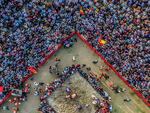
A century-old wrestling competition in Chittagong, Bangladesh, known as Abdul Jabbar's Boli Kheladraws thousands of spectators annually. In this picture from April 24, 2023, two wrestlers go at it on a sandy stage in front of a street audience.
Sanchayan Chowdhury
On a hot and humid Tuesday morning in April 2023, at the ringside of a wrestling match in Chittagong, Bangladesh, software engineer Sanchayan Chowdhury was looking for a good vantage point to launch his drone. Currently living in Finland, Chowdhury had traveled to Bangladesh to capture shots of the famed Abdul Jabbar's Boli Khela — a wrestling tournament that dates as far back as 1909 and is named after the man who started it. Boli Khela means “the game of powerful people.”
The image highlights the dedication, skill and physical prowess of the wrestlers, he says. “I decided to shoot this picture because I wanted to capture the raw energy and passion of the wrestlers as well as the vibrant atmosphere of the event. It’s a way to honor my heritage and share this unique cultural practice with a broader audience."
His photo is a finalist at this years’ Siena Drone Photo Awards.
Drone photography has really evolved over the years, says Emanuela Ascoli, one of the judges for this year’s contest. And that’s thanks to the advancement in technology. Drones can now fly faster, secure better quality images and as a result of their GPS (global positioning system) can move precisely and maintain stable positions. “This has made it easier for photographers to capture detailed and stunning aerial shots from perspectives that were previously impossible to achieve,” she says.
Overall, judges look for photographs that stand out for their technical skill, creativity, composition and visual impact, Ascoli says. “Above all, I consider the photograph's emotional and aesthetic impact, including how well it captures a moment -- the perfect moment," adding that "a great picture stops the time and raises awareness of the wonders and worries of our world."
Here's a selection of contest nominees, focusing on the Global South countries that Goats & Soda covers. The prize winners will be announced on September 28.
A pack of pelicans
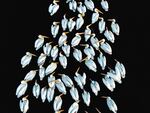
Pelicans gather in the wetland Estero el Soldado in Guaymas, Sonora, Mexico. This wetland hosts numerous migrating birds. The white pelicans stand out against waters darkened by sediment.
Guillermo Soberón
Guillemo Soberon chanced upon this scene when he set out to document the beauty of the wetlands called Estero el soldado for the media site Mongabay. “It is a natural protected area that hosts a great biodiversity, over 400 species in 350 hectares of land, and it's a beautiful space in my hometown, Guaymas, Sonora, México,” he says. As he was shooting wildlife with his camera, he launched his drone to capture shots of the ecosystem from above. He meant to create a "virtual tour" to showcase the beauty and importance of the wetlands and that’s when he spotted a flock of gleaming white pelicans.
“It was such an amazing scene, I couldn’t believe my luck,” he says. While brown pelicans are common in these parts, white pelicans are not easy to find. “I believe that the appreciation of nature is a pathway to its conservation,” Soberon says.
Crossing the Darien Gap
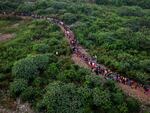
Migrants trekking through the jungle during clandestine journeys through the Darien Gap typically endure five or six days, exposed to all kinds of harsh weather conditions. Over 390,000 individuals have entered Panama through this jungle on their way to the United States.
Luis Acosta / AFP
A photographer at Agence France Press, Luis Acosta has on several occasions visited Darien Gap, the region that stretches from the Darien Province of Panama to Columbia. In 2023, over 500,000 people moved through the Darien Gap to migrate to the U.S.
In September last year, Acosta deployed a drone to capture the image. I realized that the only way to show the magnitude of the migration through the jungle was with a drone," he says. "The message I want to send with this image is how people's desperation to find a better life forces them to make such dangerous journeys, sometimes risking the lives of their loved ones," he says.
Crowds at the bullfight

More than 42,000 people witness the final minutes of a bullfight in Mexico City's Plaza México arena.
Roberto Hernandez
Drone shots of crowds create interesting visual patterns, says Roberto Hernández Guerrero, a graphic designer turned photographer.
In February 2024, a court ruling allowed bull fights to finally return to Mexico City after a gap of two years. After the two-year ban, crowds swelled. Over 40,000 people gathered at La Monumental Plaza de Toros Mexico to watch the bulls return to the arena. And he decided to aim for a drone photo.
It took a week of planning and two days of drone flying to get the perfect shot. He rented the roof of the biggest building near the Plaza de Toros and from this vantage point launched his drone.
Guerrero purchased his first drone camera a decade ago. “It started as a hobby,” he says. “I’ve flown a lot of different models, each with better technology and camera than the last. And while I enjoy the result, to be honest, I don’t enjoy flying drones, because it’s stressful,” he says. And that’s because he knows that whatever goes up can come crashing down too. “Some of my best photos involves flying drones over the heads of many people but that thought isn’t relaxing,” he laughs.
The title of this photo, "Last Minute," refers literally to the last minutes of a bull’s life. “I don’t support bullfights,” Guerrero says. “When the bull died, I almost cried, taking that last shot. But as with many aspects of my life, I respect people who think differently.” The photo, he says reflects both the pain and plight of the bulls in the arena and how they suffer, contrasting it with thousands of people who embrace the tradition.Ad
Where the Banni buffalo roam
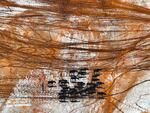
The Banni buffalo can tolerate harsh climatic conditions, surviving on scanty patches of grass and shrubs. They are commonly found in the salt marshes of India's Thar desert.
Raj Mohan
An engineer who lives in Bengaluru, India, Raj Mohan has a passion for photography and for drones that drew him to a salt marsh within the Thar desert in the western Indian state of Gujarat.
“Drones transform the mundane view of what we see everyday. Everything looks different from above,” Mohan says.
At first, he meant to seek out patterns of white salt streaks on the brown mud. However, his drone shots also caught farmers taking their Banni buffaloes out to graze in the small patches of green left. Banni buffaloes are well-adapted to survive water scarcity, frequent droughts and high temperatures.
“Ultimately, the resilience of these buffaloes serves as a powerful example of how life can adapt and survive under challenging conditions,” he says.
A 6-mile bridge

The river carves out large, tree-like ravines on the mudflat along the Jiashao Bridge that extends into the East China Sea.
Sheng Jiang
This drone photo by middle school teacher Sheng Jiang depicts Jia Shao bridge (also called the Jiaxing-Shaoxing Sea Bridge) — stretching across the mouth of the Qiantang River in the Zhejiang Province of China. It's one of the longest pylon cable sea bridges in the world, extending 6 miles.
“You can see the splendor of Chinese infrastructure,” says Jiang. She was especially fascinated by the branch-like patterns (that look like nerve endings. she says) that the river carves out in the mud flats around the bridge. In order to get the patterns in the picture which can only be seen from the air, she took the shot at midday and at low tide so the shadows of the bridge wouldn't interfere with the image.
“By combining man-made structures with unique natural landscape along the Qiantang River, I hope to show a China where man and nature co-exist in harmony,” she says.
Snowed-in village
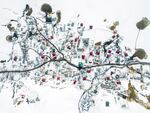
The village of Kargapazari in the Bingol province of Turkey is blanketed with a layer of white snow, resembling an absract painting from this drone perspective.
Hüseyin Karahan
Hüseyin Karahan served as an officer in the Turkish naval forces for 30 years before retiring in 2018 and indulging in his love for photography. Karahan says, "Famous Turkish photographer Ara Güler, who made me love the art of photography, has a well-known saying: 'Photos taken at random turn out better, we are happier with people we meet by chance, falling asleep in a corner is the most enjoyable sleep, unplanned activities are more fun.' In short, everything that happens spontaneously is the most beautiful. These words completely summarize the photo I took," he says.
On a February morning, Karahan visited the village of Kargapazari in the Bingol province of Turkey. He planned to photograph people leaving a mosque after prayers. However, their exit was delayed and so he raised his drone to the maximum height to see what it would see. At that moment, he says, the landscape looked like an abstract picture — and reminded him of how small we actually were in this big world.
“I love taking photos with a drone, it allows us to see things that the human eye cannot see, perhaps with the eyes of a flying bird,” says Karahan.
City meets mountains
Beijing-based Xu Zhan, who's 64, has been in love with photography since his middle school years and is a member of the China Photographer’s Association. He started using drones for filming in 2018, captivated by the perspective it could provide to ordinary landscapes.
Visiting Guiyang City in the Guizhou Province of China, he shot this photo of Qianchun Interchange bridge in July 2023. He sought to capture how the urban landscape integrates with surrounding mountainous terrain. With 11 ramps, 8 entrances and exits, and two main lines, the overpass was put into use in 2016 and is spectacular, he says. “I only took a small part of the huge overpass in this picture. The exit of the overpass between the hills draws people's attention to the bustling city and to the dazzling lights of every household.”
Nighttime photography using a drone can be a challenge, he says, because of poor visibility. His top tip: “Find a good [spot] and take enough photos until you’re satisfied.”
Kamala Thiagarajan is a freelance journalist based in Madurai, South India. She reports on global health, science and development and has been published in The New York Times, The British Medical Journal, the BBC, The Guardian and other outlets. You can find her on X: @Kamal_t.
Copyright 2024 NPR